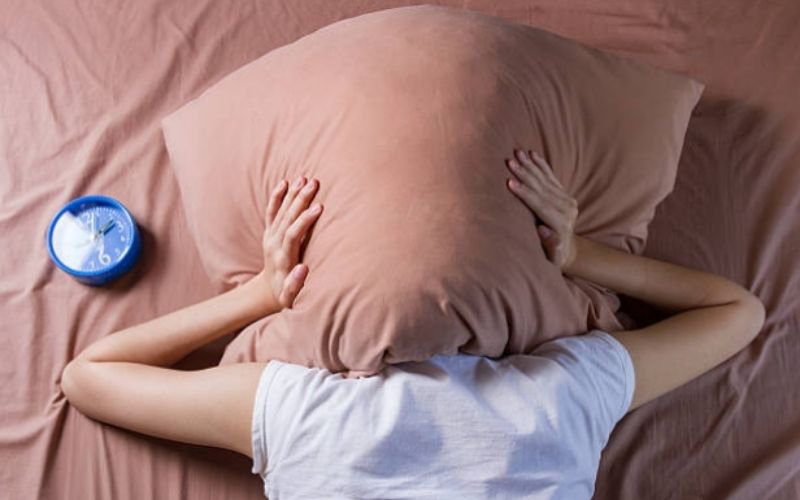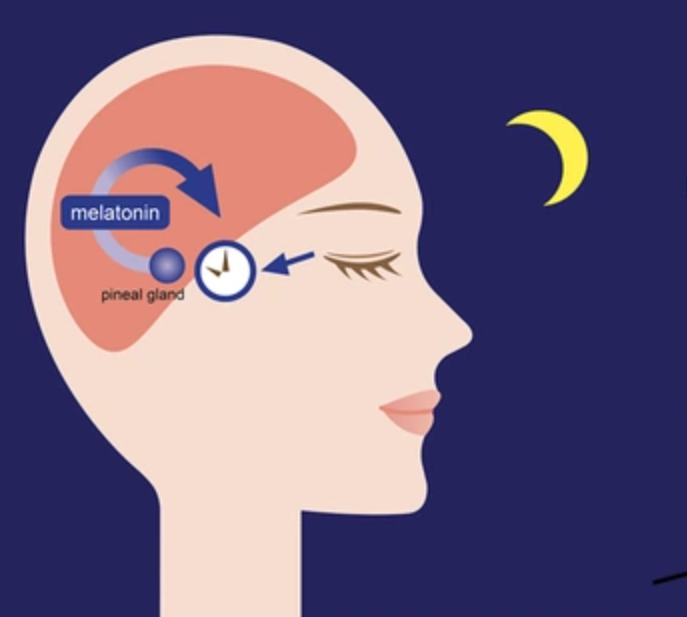How to adjust your sleep schedule?
Our sleep schedules vary from person to person, largely depending on the environmental cues we give our bodies, such as when we set our alarms, when we're most active during the day. day, when we eat and when we lie down on our pillows... So, how do we adjust our bedtime to get the good quality sleep we all need. Read more articles below to be able to adjust the appropriate sleep time and bring health benefits.
1. Sleep schedule and symptoms of irregular sleep schedule
Sleep schedule is a concept that refers to the natural time that people wake up or fall asleep each day and night. Our circadian rhythm or circadian clock is the determining factor when it comes to sleep time.
The circadian rhythm of sleep lasts about 24 hours. The 24-hour sleep-wake cycle is one of the most obvious circadian rhythms, but according to scientists and sleep experts, there are several other functions that are guided by the body's circadian cycles; including digestion, hormonal activity and body temperature.
The hypothalamus in the brain contains the “master clock” that controls the sleep-wake cycle. This watch responds to external cues, such as light levels, to keep everyone in sync with a 24-hour day of the Earth. Humans naturally fall asleep when it's dark and wake up at dawn.
A person's sleep-wake cycle and how much sleep they need overall can naturally change as they age. However, some aspects of modern life also affect a person's sleep-wake pattern. Those factors include:
Work or study schedule. Travel and the “plane delay” effect. Shift. Certain drugs. Artificial light comes from electronic devices such as phones, computers, televisions, ...

Học tập có thể ảnh hưởng đến việc điều chỉnh giấc ngủ
If a person repeatedly ignores their body's sleep signals, they may have difficulty returning to a normal sleep schedule. The main symptom of a disrupted sleep-wake cycle is difficulty falling asleep and waking at night. unreasonable times at night. A person may experience insomnia at night or excessive daytime sleepiness. Other symptoms may include:
Difficulty concentrating. Reduced alertness. Memory decline. Difficult to make decisions. People may also feel anxious about their sleep schedule or be stressed due to the disruption it causes in their lives. Lack of sleep also affects mental health.
Difficulty concentrating. Reduced alertness. Memory decline. Difficult to make decisions. People may also feel anxious about their sleep schedule or be stressed due to the disruption it causes in their lives. Lack of sleep also affects mental health.
2. 12 ways to adjust your sleep time
2.1. Correct light reception
One of the best ways to regulate our sleep schedule is to plan light exposure. When we are exposed to light, the brain stops producing melatonin, the sleep hormone. This makes us feel awake and not sleepy. In contrast, darkness stimulates the brain to produce more melatonin which makes us feel sleepy. In the morning, exposure to light can keep us awake. Try opening the blinds, going for a walk, or relaxing on a well-lit balcony.
At night, prepare for your sleep by turning off or dimming the bright lights. You should also avoid glowing electronic screens from computers, smartphones or televisions as they can stimulate your brain for several hours.
2.2. Practice relaxation
Taking time to relax can help us sleep better. When stressed or anxious, the body produces more cortisol - the stress hormone. The higher the cortisol, the more alert we feel.
Creating a relaxing bedtime routine can reduce stress and its negative effects on your sleep. Focus on activities that relax the body, such as:
Yoga . Meditation . Deep breath. Write diary. Drink caffeine-free tea.

Yoga giúp bạn điều chỉnh giấc ngủ tốt hơn
2.3. Skip the nap
If your sleep schedule is not consistent then avoid napping during the day. Napping can make it difficult to fall back asleep at night. Long naps can also cause tossing, which is the result of waking up from a deep sleep. If you must take a nap, aim for less than 30 minutes. It's best to take a nap before 3 p.m. so your night's sleep isn't disrupted.
2.4. Daily exercise
One way to reset our internal biological clock is to exercise regularly. Most tissues in the body - including skeletal muscle - are linked to the circadian clock. So when you exercise, your muscles respond by adjusting to your circadian rhythm. Exercise also helps you sleep better by boosting melatonin production.
Thirty minutes of moderate aerobic exercise can help improve the quality of your sleep that night. However, a person will get the best results with regular exercise. A goal of 30 minutes of moderate aerobic activity at least five times a week is the amount of time scientists recommend for everyone.
Remember that evening exercise can stimulate your body. If you want to exercise at night, do it at least one to two hours before bed.
2.5. Avoid noise
A restful sleep environment is essential for a good night's sleep. Your brain continues to process sound, even after you've fallen asleep. Loud, distracting noises can make it difficult to fall asleep or stay asleep. To get rid of loud noises, keep the television out of the bedroom and turn it off before you go to bed. Turn off your cell phones or put them on silent mode. If you live in a noisy neighborhood, try to design a bedroom with good soundproofing to minimize the impact of background noise or use "white noise". White noise is a soft, steady sound that masks environmental noise. You can create white noise using:
Fan. Air conditional. Humidifier. Air purifier. White noise generator.

Giấc ngủ của bạn có thể bị điều chỉnh bởi các tiếng ồn trong nhà
2.6. Keep the bedroom cool
Right before going to bed, your body temperature will drop to prepare for sleep. A cool bedroom temperature - between 60 and 67°F (about 15 to 19°C) - will help you feel more comfortable and fall asleep.
A 2012 study from the National Institutes of Health found that the temperature of the room where we sleep is one of the most important factors in achieving quality sleep. Anything that causes the room temperature to fall below 54°F (12°C) or higher than 75°F (24°C) can disrupt our sleep, so be careful Make sure the temperature in the bedroom is always at the right level. You can also use an air conditioner or fan in warmer weather or a space heater in cold weather. These will have the added benefit of producing white noise.
2.7. Create a comfortable space
Old mattresses and pillows can lead to aches and pains, making it difficult to get quality sleep. In general, experts recommend replacing the mattress every 10 years and the pillow every two years.
You should also get a new mattress or pillow if you wake up feeling tight or if you feel more comfortable sleeping in a bed away from home. The firmness of your mattress and pillow will depend on you, but if your mattress is sagging and your pillows are calloused, it's time to get a new one.
2.8. Eat early
Your circadian rhythm also reacts to your eating habits. Eating late at night can delay sleep, so eat your last meal two to three hours before bed. This will give the body enough time to digest the meal.
Eating dinner at the same time every day will also help the body form a habit. In addition, what you eat is also important. Heavy, high-fat meals can disrupt your sleep because they take a long time to digest. If you are hungry then have a snack. The best foods for sleep include a combination of carbs and protein like toast and almond butter.
Avoid beverages containing caffeine, such as coffee, tea or energy drinks. As a stimulant, caffeine takes several hours to wear off, so take it before mid-afternoon.
Ideally, you should quit drinking before you go to bed. A glass of wine may make you drowsy, but alcohol actually messes with your circadian rhythm, making it difficult to get a good night's sleep.
2.9. Try to go to bed and wake up at the same time
Choose a bedtime and wake-up time. Stick to these times every day, even on weekends or holidays. Try to avoid staying awake or sleeping for more than one to two hours. By following a regular schedule, your internal clock will likely form a new habit. Over time, you will be able to fall asleep and wake up more easily.
2.10. Try fasting
When you eat and digest food, your body's internal clock knows that you are awake. That's because metabolism and circadian rhythms are closely linked.
On the other hand, fasting puts your body in a “waiting” state so it can repair itself. Fasting is also a very normal part of sleep. Plus, your body continues to burn calories while you sleep. If you fast before bed, you're more likely to feel hungry in the morning. This can motivate you to wake up early and then, return to your normal sleep schedule over the next few days.
But remember, going to bed on an empty stomach can keep you awake. Fasting can only be helpful if you don't feel hungry.

Có thể điều chỉnh giấc ngủ qua việc nhịn ăn có kế hoạch
2.11. Consider a melatonin supplement
As mentioned earlier, melatonin is a hormone that regulates your sleep cycle. Melatonin is normally made by the pineal gland in the brain, but it is also available as a supplement. It can promote relaxation, which is why people with jet lag or insomnia often use it as a sleep aid. At appropriate doses, melatonin is generally considered safe. However, it is important to strictly follow your doctor's instructions when taking melatonin as a supplement. In addition, melatonin can also cause some side effects, including:
Drowsiness. Headache. Nausea. Dizzy. If you are taking other medications or have other health conditions consult your doctor before using melatonin.
2.12. Talk to your doctor regularly
It is normal for us to have sleep problems from time to time. Often, a change in behavior or routine can restore a normal sleep schedule. However, if sleep problems persist, see your doctor. You may have an undiagnosed sleep disorder. A sleep specialist can guide you on the proper treatment.
Shift work, staying up all night and jet lag effects can disrupt our sleep schedule. Fortunately, practicing good sleep hygiene can help get your body's circadian rhythms back on track and adjust your sleep schedule accordingly. Before sleeping, it is necessary to avoid bright lights and heavy meals. Ensure a comfortable, quiet, and cool sleeping environment. During the day, be active and skip naps for better sleep.
Please follow the website: Vinmec.com regularly to update many other useful information.
Để đặt lịch khám tại viện, Quý khách vui lòng bấm số HOTLINE hoặc đặt lịch trực tiếp TẠI ĐÂY. Tải và đặt lịch khám tự động trên ứng dụng MyVinmec để quản lý, theo dõi lịch và đặt hẹn mọi lúc mọi nơi ngay trên ứng dụng.
Reference articles: medicalnewstoday.com, sleepfoundation.org, healthline.com






